- Alamance Community College promotes an open door to high quality education and learning. Central to this mission is the belief in the incomparable worth and uniqueness of each human being. Accordingly, Alamance Community College strives to help people realize their potential and attain an education which is personally meaningful, relevant to the needs of the community and state, and responsive to significant global trends.
School Highlights
Alamance Community College serves 6,107 students (29% of students are full-time).
The college's student:teacher ratio of 15:1 is higher than the state community college average of 13:1.
Minority enrollment is 46% of the student body (majority Hispanic and Black), which is less than the state average of 48%.
Quick Stats (2025)
- Enrollment: 6,107 students
- In-state tuition: $2,175
- Out-state tuition: $7,935
- Student:teacher ratio: 15:1
- Minority enrollment: 46%
- Source: Integrated Postsecondary Education Data System (IPEDS)
Top Rankings
Alamance Community College ranks among the top 20% of public schools in North Carolina for:
Category
Attribute
Community Size
School Overview
The teacher population of 401 teachers has stayed relatively flat over five years.
Alamance Community College
(NC) Community College Avg.
Carnegie Classification
Associate's Colleges: Mixed Transfer/Career & Technical-High Nontraditional
Associate's Colleges: Mixed Transfer/Career & Technical-High Nontraditional
Institution Level
At least 2 but less than 4 years
At least 2 but less than 4 years
Institution Control
Public
Public
Total Faculty
401 staff
256 staff
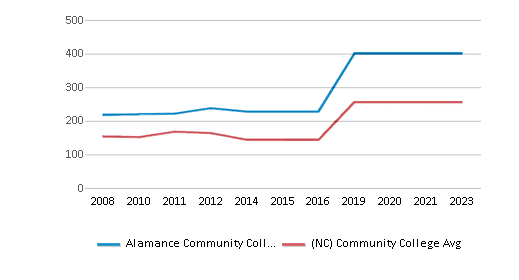
School Calendar
Student Body
The student population of Alamance Community College has grown by 41% over five years.
The student:teacher ratio of 15:1 has increased from 10:1 over five years.
The Alamance Community College diversity score of 0.65 is less than the state average of 0.66. The school's diversity has stayed relatively flat over five years.
Total Enrollment
6,107 students
2,542 students
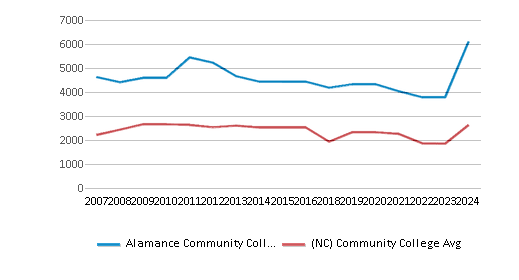
Student : Teacher Ratio
15:1
13:1
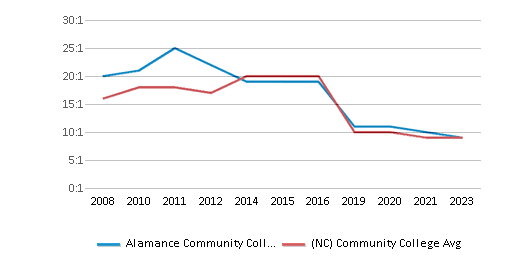
# Full-Time Students
1,773 students
766 students
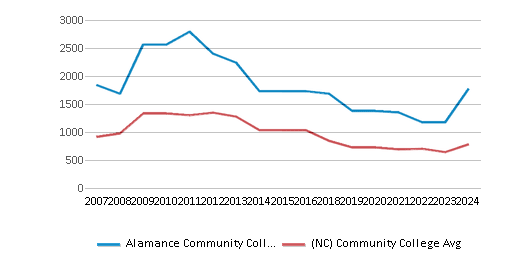
# Part-Time Students
4,334 students
1,813 students
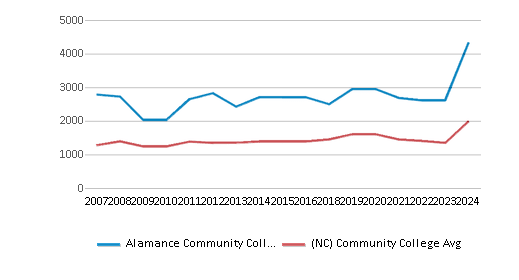
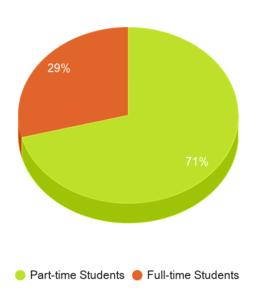
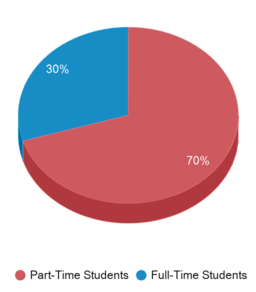
# Enrollment Undergraduate
610 students
316 students
# Full-Time Undergraduate Students
1,773 students
766 students
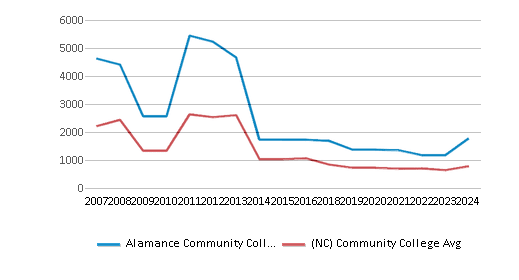
# Full-Time Graduate Students
n/a
22 students
# Part-Time Undergraduate Students
4,334 students
1,990 students
# Part-Time Graduate Students
n/a
3 students
Total Dormitory Capacity
n/a
717 students
% American Indian/Alaskan
1%
1%
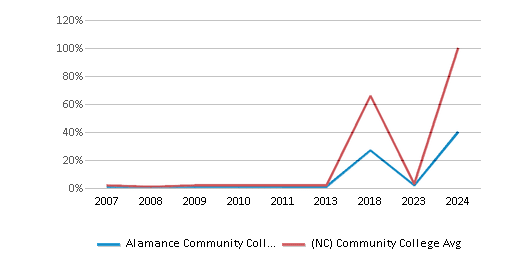
% Asian
2%
3%
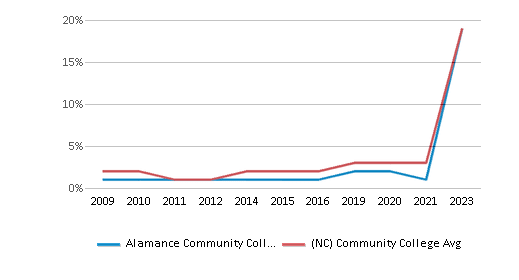
% Hispanic
18%
13%
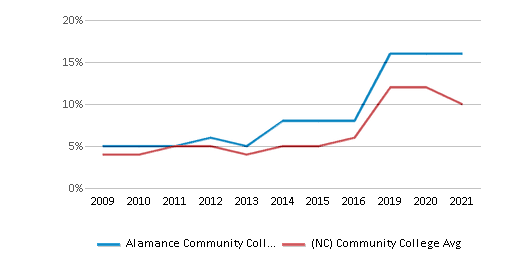
% Black
16%
21%
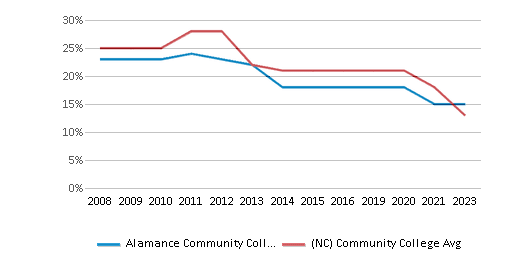
% White
54%
52%
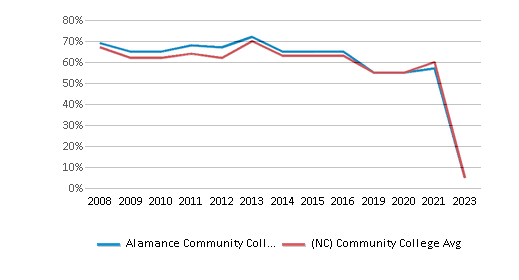
% Hawaiian
n/a
1%
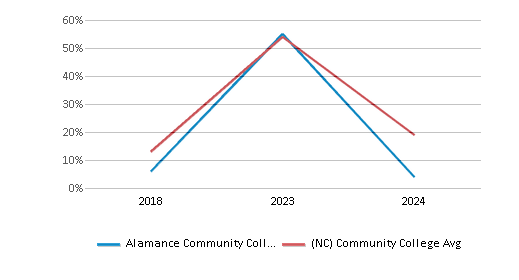
% Two or more races
1%
3%
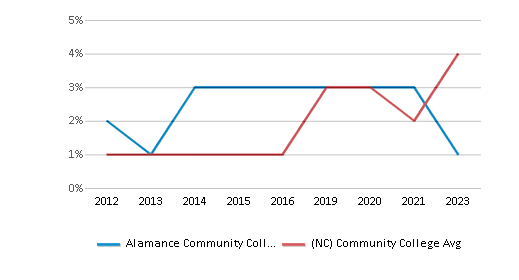
% Non Resident races
2%
1%
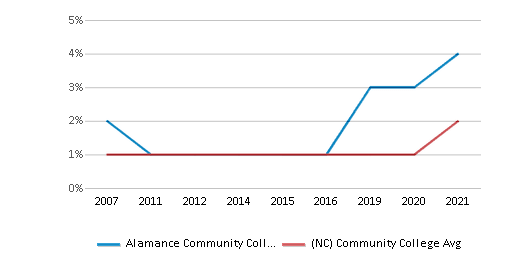
% Unknown races
5%
5%
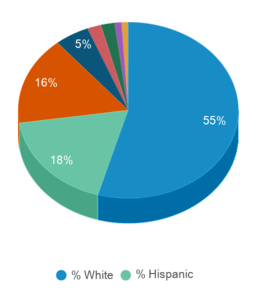
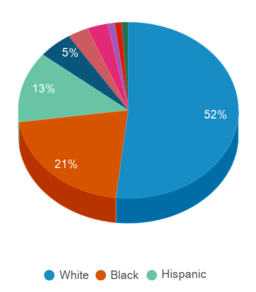
Diversity Score
0.65
0.66
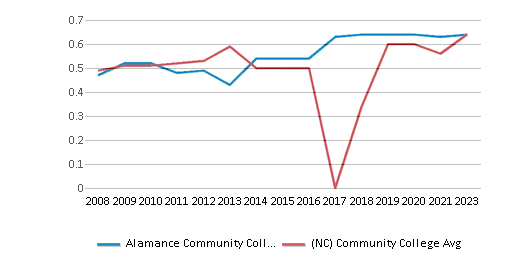
College Completion Rate (Students who graduate in less than 4 years)
0.3251%
0.3684%
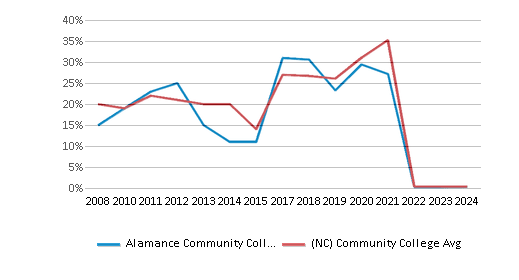
College Completion Rate (Students who graduate in 4 years or more than 4 years)
n/a
0.4286%
Average Graduate Earnings (10 Years)
$28,000
$27,500
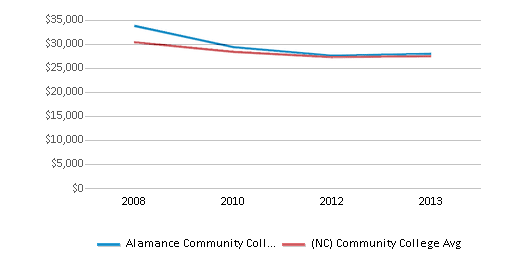
Tuition and Acceptance Rate
The public in-state tuition of $2,175 is less than the state average of $3,915. The in-state tuition has declined by 12% over four years.
The public out-state tuition of $7,935 is less than the state average of $9,508. The out-state tuition has declined by 8% over four years.
In-State Tuition Fees
$2,175
$3,915
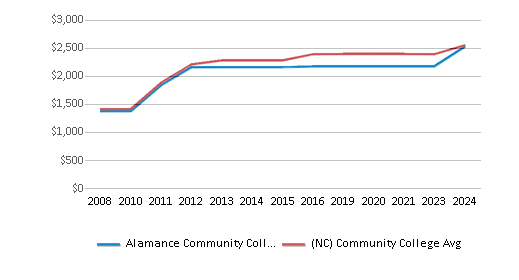
Out-State Tuition Fees
$7,935
$9,508
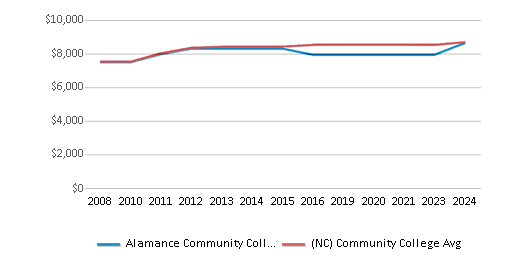
% Students Receiving Some Financial Aid
74%
82%
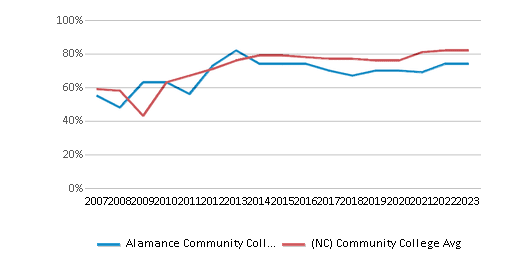
Median Debt for Graduates
n/a
$11,865
Median Debt for Dropouts
n/a
$5,846
Acceptance Rate
n/a
82%
SAT Reading
n/a
488
SAT Math
n/a
498
ACT Composite
n/a
20
ACT English
n/a
13
ACT Math
n/a
16
Source: 2024 (or latest year available) Integrated Postsecondary Education Data System (IPEDS)
School Notes
- Alamance Community College was established in 1958 as part of a statewide system known as industrial education centers. Through the cooperative efforts of the State Department of Trade and Industrial Education and the school systems of Alamance County and Burlington, Burlington-Alamance County Industrial Education Center was begun. In June 1996, the college opened a new 49,535-square-foot science and technology building on the main campus in Graham. The building includes multipurpose classrooms, laboratories, and offices. The building was made possible through funding from both the North Carolina Community College Construction Bonds and appropriations from the Alamance County Commissioners. In August 2001, the college opened the 20,000 square-foot Burlington Center at the Burlington Market Shopping Center. ACC offers many program options for students wanting to earn associate degrees, diplomas, or certificates. Students may choose from curriculum areas of business, health and public services, and industrial and graphics technologies, or complete course work for transfer to a four-year college or university. We have many programs to offer not found everywhere such as Animal Care, Biotechnology, Culinary Technology, Horticulture,and Dental Assisting. The faculty and staff of Alamance Community College are proud of our tradition of providing educational opportunities to meet the needs of a diverse population and an ever-changing workplace. The college provides Adult Basic Education (ABE), Adult High School, Compensatory Education, General Educational Development (GED), and English as a Second Language (ESL) programs.
Frequently Asked Questions
How much does Alamance Community College cost?
Alamance Community College's tuition is approximately $2,175 for In-State students and $7,935 for Out-State students.
What is Alamance Community College's ranking?
Alamance Community College ranks among the top 20% of community college in North Carolina for: Largest student body.
Recent Articles

Obtaining Your Bachelor's Degree at a Community College
Explore the evolving landscape of community colleges offering bachelor's degrees, addressing affordability, accessibility, and workforce needs.

A to Z of Community College Certificates and Courses
From business and healthcare to technology and skilled trades, the article showcases the breadth of options available to students seeking to enhance their knowledge, develop new skills, or pursue career advancement.

What is a Community College?
This comprehensive guide explains what a community college is, its history, and its role in higher education. It covers the types of programs offered, differences from four-year colleges, benefits of attending, and important considerations for prospective students, providing valuable insights for those exploring educational options.









